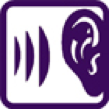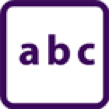Accessibility
Most people are aware that people have different levels of ability, experience and foreknowledge of computers. There are a large number of working people whose daily jobs involve little or no actual contact with computers. This is readily accepted and accommodated with appropriate training.
There are also a large number of people whose use of computers is limited due to the way in which information and services are provided (over the internet or on a company intranet for example) and through any limitations of the hardware and software they are using may also suffer discrimination.
We are always ready to listen to computer users who have specific issues over accessibility and feel that we are not addressing them. Please contact us, we will treat your concerns seriously.
Help with accessibility
NHS Choices has a close partnership with AbilityNet, a national charity that helps disabled adults and children to use computers and the internet. The 'Help with accessibility' guide provides comprehensive, step-by-step instructions on how to adjust your computer and browser according to your needs, such as for sight or hearing problems. This includes information such as how to make the text larger in different browsers, change your keyboard or mouse settings, or increase colour contrast.
Links below to specific areas of accessibility requirements:
Disability discrimination act 2005 - see attached ‘Disability discrimination act 2005 Correction Slip ukpgacs_20050013_en.pdf’
Correction slip 14/02/2013 – see attached ‘Disability discrimination act 2005 ukpgaen_20050013_en.pdf’



